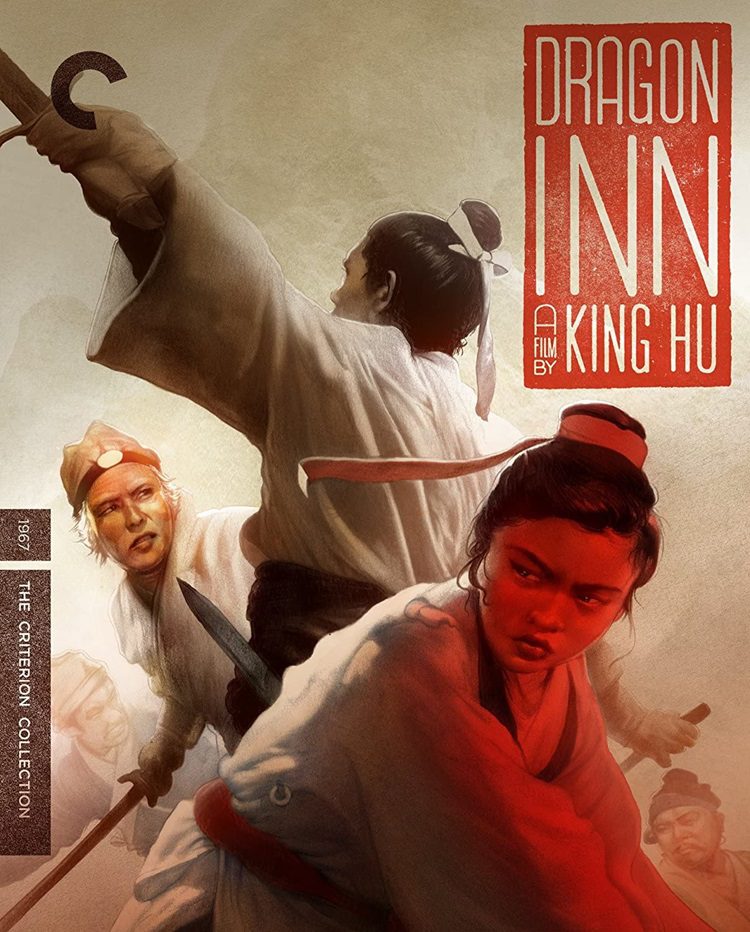
King Hu’s second entry into the Criterion Collection is Dragon Inn (1967), his first film after leaving the Shaw Brothers Studios in Hong King and moving to seek greater artistic liberties as a director in Taiwan. Set against a backdrop of political intrigue, writer/director Hu does very well with both job duties, creating visually interesting action sequences that blend into an entertaining story.
Set in 1457 A.D. during China’s Ming Dynasty, eunuchs led by Cao Shao-qin (Bai Ying), who is“unsurpassed in the martial arts,” seize power. This gives them control over two espionage agencies, the Eastern Depot and the Imperial Guards, which keep the people living in fear. Yu Quian (Wen Tian), the Minister of Defense, is framed by the eunuchs and set to be the executed. His children are banished, but Cao wants them killed. The Eastern Depot troops, led by Commander Pi Shao-tang (Miao Tien), go in search of them and come upon Wu Ning’s (Tsao Chien) Dragon Inn, a dilapidated place, and they take over.
Xiao Shao-zi (Shih Chun) arrives at the inn soon after. The guards try to force him to leave, but with his superior fighting skills he doesn’t have to listen. The Zhu brothers [one seen previously (Hsieh Han) saving Yu’s children; the other (Shangkuan Ling-fung) is so obviously not what he appears, it’s hard to believe no character notices] are ambushed and pursue the men to the Inn. Alliances are revealed and when Yu’s children arrive at the Inn, the fight for their lives is on.
The fight scenes are compelling because of the choices Hun and his editor Hung-min Chen made in manipulating the action. Rather than fluid activity like a choreographed dance, some times jump cuts are used, causing the movements to be herky jerky, and the actions impossible at times, creating an unease from the chaos of people attacking each other.
The following text appears on the back of the foldout poster that is included with this release: “Commissioned by the Ministry of Culture and Chinese Taipei Film Archive in 2013 as part of the Taiwan Film Classics Digital Restoration and Value-Adding Project, this new digital transfer was created under the supervision of cinematographer Hua Hui-ying in 4K on an ARRISCAN Archive Gui film scanner from the 35mm original camera negative. L’Immagine Ritrovata in Bologna, Italy, restored the picture element using Revival from DaVinci/Blackmagic and Digital Vision’s Phoenix. “
The video offers great colors, especially when uniformed soldiers appear against the grayish-blue skies, like during the opening sequence, and the dark browns of the Inn’s interior. White garments are bright and accurate, and blacks are solid, contributing to a strong contrast. The image loses sharpness on the edge of some frames during long shots and in the backgrounds of shots with limited depth of field, but that’s a source issue not a transfer.
Also from the foldout text, “The original monaural soundtrack was captured from the 35 mm original sound negative on a COSP-Xi 2 K optical scanner and remastered by L’Immagine Ritrovat.” Although in Mandarin, the emotion of the actors comes through in their dialogue. The sounds of body movement is believable but the clanging of swords is not. At times, the score is too loud, especially the high end, and can distort because of this, as heard at the 58-min mark. The track sounded free of signs of wear or defect.
The HD Special Edition Features include:
- The Phoenix Rises (11 min) – In a 2018 interview for this release, actress Shangkuan Ling-fung talks about working on Dragon Inn, her first film, and also covers her training and career.
- Making History (11 min) – In a 2016 interview for Criterion, actor Shih Chun discusses his experiences working on the film, such as how Hu worked as a director, and reveals “Xiao Shao-zi launched [his] career as an actor.”
- Art in Action (26 min) – In a 2018 interview for this release, Grady Hendrix, author and co-founder of the New York Asian Film Festival, discusses director Hu’s aesthetic sensibility. During his thorough, informative breakdown of a scene, he presents great insights about the film, Hu’s influences, and even what was happening in Taiwanese society at the time. Afterwards, the complete scene plays.
- Premiere Newsreel (2 min) – Filmed in Taipei 1967, newsreel footage of the event.
- Trailer (2 min).
Fans of the genre will do themselves a favor if they plan a stop at Dragon Inn. Criterion’s Blu-ray delivers video that’s pleasing, audio that is serviceable due to the source’s limitations, and a few extras that will educate about the film and its maker.